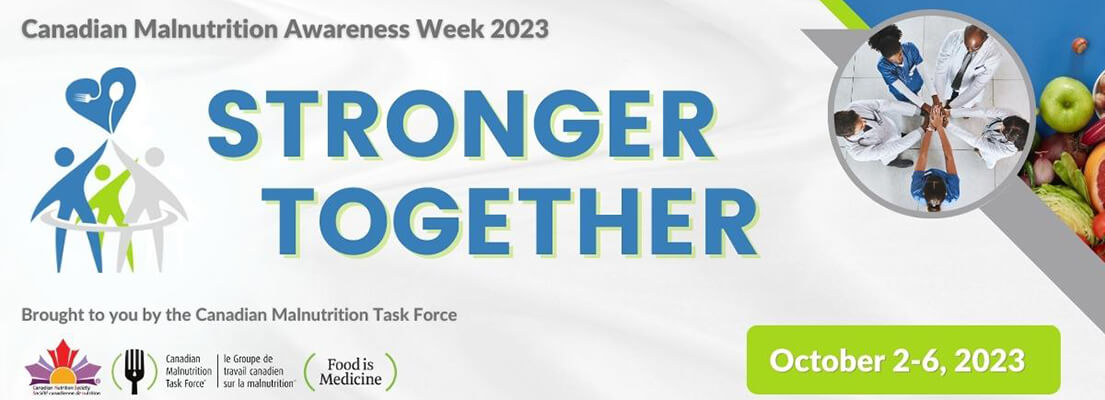Malnutrition Week October 2-6, 2023

Stronger together. The 1 in 3 older adults in the community at nutrition risk and the 2 in 3 people in long term care with malnutrition are counting on their health care teams to work together to address malnutrition. This year, Malnutrition Week from October 2-6th is focused on making team based care even better for those at risk of and those living with malnutrition. Take a look at the ideas below to see how to help prevent and treat malnutrition.
Patients and residents
- Tell your healthcare team if you have lost weight without trying or are eating less than usual or don’t feel like eating.
Health care aides
- Help with meal set up and assist the person to eat as needed.
- Measure patient/resident weights and talk with the team if you notice poor food intake or weight loss.
Housekeeping
- Avoid cleaning rooms on the unit when meals are being served.
- Help patients and families keep beside tables clear for meals and uneaten food properly stored.
Food Services
- Serve nutrient dense, appealing food that considers culture, likes and dislikes.
- Ensure food is available during the day and after food service hours too.
Allied Health
- Identify patients at nutrition risk such as those living with food insecurity or unable to do their own shopping or cooking.
- Suggest least restrictive diets that are still safe for the patient or resident.
- Use medications to help when intake is poor (to reduce nausea, vomiting, diarrhea, constipation, pain, etc.)
- Develop plans that support best seating, position, support and tools at meal times.
Nurses
- Screen patients and residents for nutrition risk and work as a team to create a plan.
- Encourage family and friends to bring in food and stay for meal time visit if patient/resident is not eating well.
- Decrease mealtime interruptions.
Doctors
- Diagnose, document and treat malnutrition. Don’t forget nutrition as part of discharge plans.
- Order diets with few restrictions and Medpass (high energy drink to take with medications) when appropriate.
- Say No to NPO (nothing by mouth)
Family, friends and volunteers
- Talk to the care team if you have concerns about your family member/friend’s weight loss or decreased food intake.
- Assist your family member/friend with setting up at meals and help them to eat as much as possible from what is served.
- Provide company during meals
For more ideas in how we can be Stronger Together against malnutrition, check out: Involving Everyone in Nutrition Care or www.nutritioncareincanada.ca.
References
Public Health Agency of Canada PHAC. (2010). The chief public health officer’s report on the state of public health in Canada 2010 – Growing older: adding life to years.
Keller H, Vucea V, Slaughter SE, Jager-Wittenaar H, Lengyel C, Ottery FD, Carrier N. Prevalence of Malnutrition or Risk in Residents in Long Term Care: Comparison of Four Tools. J Nutr Gerontol Geriatr. 2019 Oct-Dec;38(4):329-344. doi: 10.1080/21551197.2019.1640165. Epub 2019 Jul 23. PMID: 31335280.
Ramage-Morin et al. Health Reports 2013
Schuetz et al. Lancet 2019;
Howatson et al. J Prim Health Care 2015

